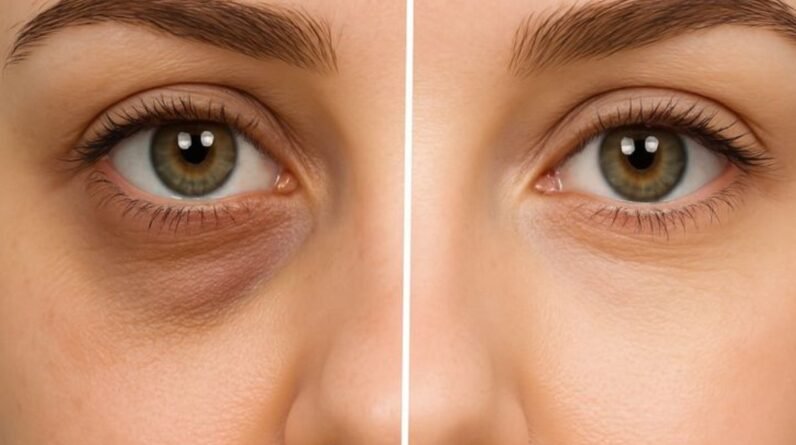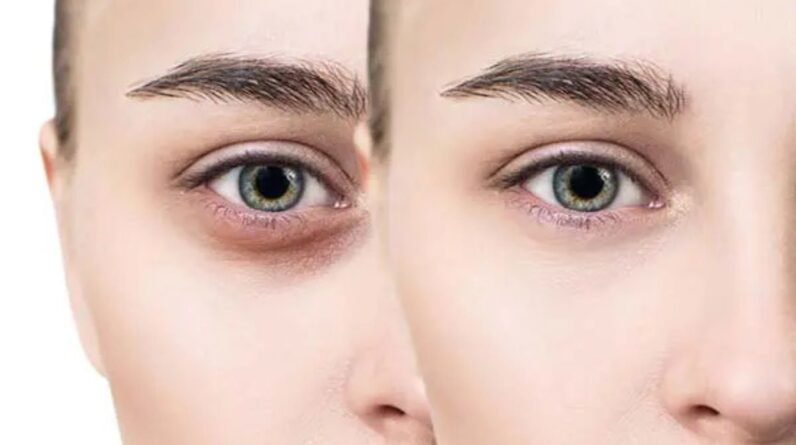
In a world where screens dominate our daily lives, our eyes often bear the brunt of it. Whether it’s staring at a computer for work or scrolling through social media, our eyes are constantly working overtime. There were natural ways to improve and maintain your eye health without relying solely on glasses or contact lenses.

Common Causes of Poor Vision
Understanding the factors that contribute to poor vision is essential in preventing and addressing eye health issues. Several common causes can lead to vision problems, and being aware of these can help you take proactive steps to protect your eyesight.
1. Aging and Vision Decline
One of the most frequent reasons for declining vision is aging. As we age, the eyes’ lenses become less flexible, leading to conditions like presbyopia, where it’s difficult to focus on close objects. Cataracts, a clouding of the eye’s lens, also become more prevalent with age, contributing to blurred vision.
2. Genetics and Hereditary Eye Conditions
Genetics play a significant role in determining eye health. Conditions such as myopia (nearsightedness), hyperopia (farsightedness), and astigmatism often run in families. If your parents or grandparents had vision issues, you might be more prone to developing similar problems.
3. Exposure to Harmful UV Rays
Exposure to the sun’s harmful UV rays can harm your eyes. Prolonged exposure can lead to conditions like photokeratitis, a painful sunburn on the eye’s surface. Over time, excessive UV exposure can also contribute to cataracts and macular degeneration, which can cause blurred vision and even blindness.
4. Poor Diet and Nutritional Deficiencies
A diet lacking in essential nutrients can lead to poor vision. Vitamins like A, C, and E, along with minerals like zinc, are crucial for maintaining eye health. Deficiencies in these nutrients can lead to conditions like night blindness and increase the risk of developing cataracts.
5. Digital Eye Strain
With the increasing use of digital devices, digital eye strain has become a widespread issue. Staring at screens for long periods can cause symptoms such as headaches, blurred vision, and dry eyes. Exposure to blue light from screens can lead to eye strain and interfere with your sleep cycle.
6. Chronic Health Conditions
Certain chronic health conditions, such as diabetes and hypertension, can adversely affect vision. Diabetes, for instance, can lead to diabetic retinopathy, a condition where high blood sugar levels damage the blood vessels in the retina. Hypertension can also cause damage to the retina and lead to vision problems.
7. Poor Eye Care Habits
Neglecting regular eye check-ups and not following proper eye care practices can contribute to poor vision. For example, not wearing prescribed glasses or contacts can strain the eyes and worsen vision problems over time. Additionally, improper hygiene when handling contact lenses can lead to infections that harm the eyes.
8. Environmental Factors
Environmental factors such as pollution, dust, and exposure to chemicals can irritate the eyes and lead to vision problems. Smokers are also at higher risk of developing eye conditions like macular degeneration and cataracts due to the harmful effects of tobacco smoke on the eyes.
By understanding these common causes of poor vision, you can take steps to protect your eyesight and maintain good eye health.

The Importance of Eye Health
Our eyes are an integral part of our daily lives, allowing us to engage with the world, whether it’s reading a book, driving a car, or enjoying the beauty of nature. They are your the gateway to your world, enabling you to experience and interact with your surroundings.
Healthy eyes are essential for both seeing clearly and living a fulfilling life. Proper eye care helps prevent vision problems, enhances quality of life, and supports your ability to perform daily activities.
Prevention of Vision Problems
Regular eye care is essential for preventing common vision problems such as nearsightedness, farsightedness, and astigmatism. By taking care of your eyes through regular check-ups and protective measures, you can identify and address potential issues early, reducing the risk of long-term damage. Early detection of conditions like glaucoma, macular degeneration, and cataracts can make a significant difference in preserving your vision.
Improved Quality of Life
Good eye health directly impacts your quality of life. Clear vision allows you to enjoy activities like reading, driving, and watching movies without strain or discomfort. It also enhances your ability to perform tasks at work or school, leading to greater productivity and satisfaction. Poor vision, on the other hand, can lead to frustration, reduced independence, and a decreased ability to enjoy life’s simple pleasures.
Supports Overall Health
Your eyes can tell a lot about how healthy you are. Regular eye exams can detect signs of chronic conditions like diabetes, high blood pressure, and high cholesterol. These exams can catch health issues early, allowing you to manage them effectively before they cause significant harm. Additionally, healthy eyes contribute to better posture and balance, reducing the risk of accidents and injuries.
Prevents Eye Strain and Fatigue
In today’s digital age, many people experience eye strain from prolonged screen time. Eye strain causes headaches, blurry vision, and concentration problems. By prioritizing eye health, you can prevent these issues through practices like the 20-20-20 rule (taking a 20-second break to look at something 20 feet away every 20 minutes) and using proper lighting. Reducing eye strain helps maintain focus and comfort throughout the day.
Maintains Cognitive Function
Good vision is closely linked to cognitive function, especially as we age. Studies have shown that maintaining eye health can reduce the risk of cognitive decline and dementia. Clear vision enables better interaction with the environment, keeping the brain engaged and active. This connection underscores the importance of eye health for mental well-being and longevity.
Enhances Safety and Independence
Clear vision is essential for safety, particularly when driving or operating machinery. Poor vision can increase the risk of accidents and injuries. By taking care of your eyes, you can ensure that you remain safe in various situations and maintain your independence as you age. Being able to see clearly allows you to move confidently and perform tasks without relying on others.
Reduces Healthcare Costs
Investing in eye health can lead to significant savings in healthcare costs over time. Preventing vision problems through regular eye exams, proper nutrition, and protective measures can reduce the need for expensive treatments, surgeries, or corrective lenses. Maintaining eye health is a cost-effective way to protect your vision and overall health.
Emotional and Mental Well-being
Vision plays a vital role in how we perceive the world and interact with others. Good eye health supports emotional and mental well-being by enabling us to connect with our surroundings and loved ones. Poor vision can lead to social isolation, anxiety, and depression. Prioritizing eye health helps maintain strong social connections and a positive outlook on life.
In conclusion, maintaining eye health is essential for preventing vision problems, supporting overall health, and enhancing quality of life. By taking proactive steps to care for your eyes, you can ensure clear vision, safety, and well-being throughout your life.
Secrets To Natural Eye Improvement
Are you tired of squinting at screens or feeling like your vision isn’t as sharp as it used to be? It’s time to take charge of your eye health. Here are some secrets to naturally enhancing your vision and improving your overall eye well-being.
Diet and Nutrition: Eating for Eye Health

What you put into your body can directly affect your eyesight. A diet rich in fruits, vegetables, and omega-3 fatty acids can do wonders for your vision. Carrots, spinach, and kale are packed with Vitamin A, lutein, and zeaxanthin—nutrients that protect your eyes from damage and improve night vision. Omega-3 fatty acids, found in fish like salmon, help prevent dry eyes and macular degeneration. Adding these foods to your diet can revolutionize your eye health.
Eye Exercises: Strengthening Your Vision

Your eyes, similar to other muscles, can improve with regular exercise. Eye exercises can help reduce strain, improve focus, and even enhance your overall vision. One simple exercise is the 20-20-20 rule: every 20 minutes, look at something 20 feet away for 20 seconds. This helps relax your eye muscles and reduce fatigue. Another effective exercise is the palming technique, where you gently cup your hands over your closed eyes, allowing them to rest and rejuvenate.
The Role of Hydration in Eye Health

Staying hydrated is not only crucial for your overall health but also for your eyes. Dehydration can lead to dry eyes, which can cause discomfort and even blurry vision. Drinking enough water throughout the day helps maintain the moisture balance in your eyes, keeping them lubricated and functioning properly. If you struggle with dry eyes, consider using a humidifier in your home and drinking plenty of fluids.
Reducing Screen Time: Giving Your Eyes a Break

In our digital age, reducing screen time might seem like a daunting task, but it’s essential for your eye health. Prolonged exposure to screens can lead to digital eye strain, causing symptoms like headaches, dry eyes, and blurred vision. Implementing screen breaks, adjusting your screen’s brightness, and using blue light filters can help alleviate these symptoms. Additionally, try to spend more time outdoors—natural light is beneficial for your eyes and can reduce the risk of nearsightedness.
Protecting Your Eyes from Harmful UV Rays

Just like your skin, your eyes are vulnerable to the sun’s harmful UV rays. Excessive exposure may lead to cataracts, macular degeneration, and other eye problems. Wearing sunglasses that block 100% of UV rays is a simple yet effective way to protect your eyes. When choosing sunglasses, look for labels that specify UVA and UVB protection, and opt for larger frames that cover more of your eye area.
The Benefits of Regular Eye Exams

Regular eye exams are essential for maintaining good eye health and catching potential problems early. Even if you don’t wear glasses or contact lenses, an annual eye exam can detect issues like glaucoma, cataracts, and macular degeneration before they become severe. Eye exams also provide an opportunity to discuss any changes in your vision or concerns with your eye doctor, ensuring that you’re doing everything you can to protect your sight.
Stress Management: A Key to Better Vision

Stress doesn’t just affect your mind, it can also impact your eyes. High levels of stress can lead to eye strain, blurred vision, and even twitching. Incorporating stress-reducing activities into your daily routine, such as yoga, meditation, or simply taking a walk in nature, can have a positive effect on your eye health. Think of stress as a fog that clouds your vision—by clearing it away, you can see more clearly and keep your eyes in top condition.
Natural Supplements for Eye Health

While a balanced diet is crucial for eye health, sometimes we need a little extra help. Natural supplements like Vitamin C, Vitamin E, and zinc can provide the nutrients your eyes need to stay healthy. These antioxidants help protect your eyes from damage caused by free radicals and reduce the risk of age-related eye conditions. However, it’s essential to consult with your healthcare provider before adding any supplements to your routine to ensure they’re safe and effective for you.
The Power of Sleep for Eye Recovery

Sleep is the body’s natural way of healing and rejuvenation, and your eyes are no exception. During sleep, your eyes have a chance to rest, repair, and recover from the strain of the day. Lack of sleep can lead to eye strain, dry eyes, and even more serious conditions like glaucoma. Aim for 7-9 hours of uninterrupted sleep each night to give your eyes the rest they need. Create a relaxing bedtime routine and avoid screens before bed to improve your sleep quality.
Natural Remedies for Eye Care
Several natural remedies can support eye health. For instance, applying cucumber slices or cold tea bags on your eyes can reduce puffiness and soothe tired eyes. Additionally, using herbal supplements like bilberry extract can enhance night vision.

Myths vs. Facts: Debunking Eye Health Myths
When it comes to eye health, there are countless myths and misconceptions that have been passed down through generations. These myths can often lead to unnecessary worry or, worse, improper care of your eyes. It’s essential to separate fact from fiction to ensure that you’re taking the right steps to protect and maintain your vision. Let’s explore some of the most common eye health myths and uncover the truth behind them.
Myth 1: Reading In Low Light Harms Your Eyesight.
One of the most pervasive myths is that reading in dim light can cause permanent damage to your eyes. While it’s true that reading in low light can cause temporary eye strain, it doesn’t harm your eyes in the long term. Eye strain might make your eyes feel tired or cause headaches, but these symptoms typically disappear once you rest your eyes. If you prefer reading in dim light, consider using a reading lamp to reduce strain, but rest assured that it won’t ruin your eyesight.
Myth 2: Wearing Glasses or Contacts Will Weaken Your Eyes
Many people believe that wearing glasses or contact lenses will make your eyes dependent on them, ultimately weakening your vision. This myth is simply not true. Glasses and contacts are corrective lenses that help your eyes focus correctly, allowing you to see more clearly. They do not alter the physical structure of your eyes or cause your vision to worsen. In fact, not wearing your prescribed lenses can lead to eye strain and discomfort, so it’s essential to wear them as advised by your eye doctor.
Myth 3: Watching TV Too Closely Can Damage Your Eyes
This myth likely originated from the early days of television when screens emitted higher levels of radiation. However, modern screens are much safer, and sitting close to them won’t cause permanent eye damage. While sitting too close to the TV can cause temporary eye strain or fatigue, it won’t harm your eyes long-term. If you or your children prefer sitting close to the screen, just be mindful of taking breaks to rest your eyes.
Myth 4: Carrots Will Give You Perfect Vision
Carrots have long been touted as the ultimate eye food, leading many to believe that eating them can give you perfect vision. While it’s true that carrots are rich in Vitamin A, which is essential for maintaining good eye health, they won’t magically improve your vision to 20/20. Vitamin A helps protect the surface of the eye and is important for good night vision, but it’s not a cure-all. A balanced diet that includes a variety of fruits and vegetables is the best way to support your eye health.
Myth 5: Crossing Your Eyes Will Make Them Stay That Way
As children, many of us were warned that if we crossed our eyes, they might get stuck that way. This myth has no basis in reality. Crossing your eyes is a voluntary action controlled by the muscles around your eyes. While it might be uncomfortable or cause temporary double vision, your eyes will return to their normal position once you relax the muscles. However, frequent or excessive crossing of the eyes could indicate an underlying issue, such as strabismus, which should be checked by an eye care professional.
Myth 6: Only Older People Need to Worry About Eye Health
Eyes problem is often associated with aging, leading some to believe that it’s only something older adults need to worry about. While it’s true that the risk of eye conditions like cataracts and macular degeneration increases with age, eye health is important at every stage of life. Conditions like digital eye strain, myopia (nearsightedness), and dry eyes can affect people of all ages. Taking care of your eyes from a young age by practicing good habits and getting regular eye exams can help prevent problems later in life.
Myth 7: Eye Exercises Can Eliminate the Need for Glasses
Some believe that eye exercises can strengthen your eye muscles to the point where you no longer need glasses. While eye exercises can help reduce eye strain and improve focus, they do not correct refractive errors like myopia, hyperopia (farsightedness), or astigmatism. These conditions are caused by the shape of your eye and require corrective lenses or surgery to address. Eye exercises can be beneficial for overall eye health, but they are not a substitute for glasses or contact lenses.
Myth 8: Sunglasses Are Only Necessary on Sunny Days
Many people believe that sunglasses are only necessary on bright, sunny days. However, harmful UV rays can penetrate through clouds, meaning your eyes are still at risk on overcast days. UV exposure can lead to cataracts, macular degeneration, and other eye conditions over time. Wearing sunglasses that block 100% of UVA and UVB rays is important whenever you’re outdoors, regardless of the weather.
Myth 9: Vision Loss Is a Normal Part of Aging
While some changes in vision are a natural part of aging, significant vision loss is not inevitable. Many age-related eye conditions, such as cataracts, glaucoma, and macular degeneration, can be treated or managed with early detection and proper care. Regular eye exams are crucial in identifying these conditions early, allowing for effective treatment that can preserve your vision. Maintaining a healthy lifestyle, including a balanced diet and regular exercise, can also help protect your eyes as you age.
Myth 10: Eye Drops Can Cure All Eye Problems
Eye drops can be a helpful remedy for certain eye conditions, such as dry eyes or allergies, but they are not a cure-all. Over-the-counter eye drops are designed to relieve symptoms, not to treat underlying causes. For example, if you have an eye infection, using the wrong type of eye drops could make the condition worse. It’s important to use eye drops as directed by your eye doctor and to consult a professional if you’re experiencing ongoing or severe eye issues.
By understanding the facts behind these common eye health myths, you can make more informed decisions about your eye care. Proper knowledge empowers you to take the right steps to protect and preserve your vision for the long term.

FAQs About Natural Eyes Improvement
1. Can diet really improve my vision?
Yes, a diet rich in vitamins and antioxidants can support eye health and even improve your vision over time.
2. Are eye exercises effective for improving vision?
Eye exercises can help reduce strain and improve focus, but they are not a cure-all for vision problems.
3. How often should I get an eye exam?
It’s recommended to have an eye exam at least once a year, even if you don’t wear glasses or contact lenses.
4. Do blue light glasses really work?
Blue light glasses can reduce digital eye strain, but more research is needed to determine their long-term effectiveness.
5. Can stress affect my vision?
Yes, high levels of stress can lead to eye strain and other vision issues, making stress management important for eye health.
Conclusion: Taking Charge of Your Eyes
Your eyes are essential for daily life. Take good care of them. By adopting healthy habits, protecting your eyes from harmful elements, and staying informed about eye health, you can maintain clear vision and prevent future problems. Regular eye exams, a healthy diet, and proper eye care practices are essential in preventing vision decline and ensuring long-term eye health. Remember, small changes can make a big difference so start today and take charge of your eye health.






